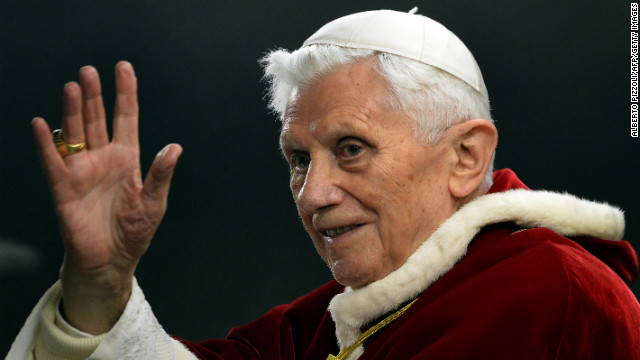I share with you two concerns. One is the Pelagian current that there is in the Church at this moment. There are some restorationist groups. I know some, it fell upon me to receive them in Buenos Aires. And one feels as if one goes back 60 years! Before the Council... One feels in 1940... An anecdote, just to illustrate this, it is not to laugh at it, I took it with respect, but it concerns me; when I was elected, I received a letter from one of these groups, and they said: "Your Holiness, we offer you this spiritual treasure: 3,525 rosaries." Why don't they say, 'we pray for you, we ask...', but this thing of counting... And these groups return to practices and to disciplines that I lived through - not you, because you are not old - to disciplines, to things that in that moment took place, but not now, they do not exist today...
I can't help being reminded of an old joke. A man asked a Fransiscan and a Jesuit: 'How many novenas must I say to get a Mercedes?'
The Fransiscan replied: 'What's a Mercedes?'
The Jesuit replied: 'What's a novena?'
Boom boom!
The counting of prayers for a spiritual bouquet reminded Pope Francis of a strand in pre-Conciliar spirituality which could appear to emphasise quantity, the measuring and counting of good works. The old Manual of Indulgences encouraged this because you often got your indulgence from a certain number of prayers, or said on a certain number of days, and measured the indulgences themselves in terms of days or years (not, be it noted, off purgatory, but as equivalent to days of public penance). So if this is a problem it came from the top - it wasn't just a popular distortion.
 I'm not sure if it really was a problem, perhaps it was. It might look a little as though, in a Pelagain fashion, one could earn merit by piling up works without grace, though that is clearly not the official explanation of how it works. Pope Paul VI's new 'Enchiridion' of indulgences changed all that and now it is so vague what you need to do or what you get in return that it is rather difficult to use. So perhaps we've swapped one problem for another.
I'm not sure if it really was a problem, perhaps it was. It might look a little as though, in a Pelagain fashion, one could earn merit by piling up works without grace, though that is clearly not the official explanation of how it works. Pope Paul VI's new 'Enchiridion' of indulgences changed all that and now it is so vague what you need to do or what you get in return that it is rather difficult to use. So perhaps we've swapped one problem for another.But I think that Pope Francis' example of this attitude is not so well chosen, because a spiritual bouquet is clearly not about earning credit with God for oneself, it is about imploring grace for another. The point of counting the rosaries is that it shows that it derives from a group of people engaged in a corporate effort. It is hard to see how that could be expressed otherwise.
The real question, nevertheless, is whether there is a Pelagian element in the more traditional spirituality found among traddy groups, and here I think we can defend ourselves. Because the direction of traditional spirituality, by contrast with certain trends in the post-Concilar Church, is demonstrably anti-Pelagian.
One way this shows itself is in the prayers of the Mass. The Collects of the ancient Roman liturgy, and to a great extent the readings and other Propers and the Ordinary, are very concerned with grace, human sin and inadequacy; they are quite Augustinian. In preparing the new Missal, Bugnini and his collaborators wanted to remove the 'negative' theme of sin, and this meant that grace had to go as well. If you look at a survey of the changes to the Collects, such as Fr Cekada's 'The Problems with the Prayers of the New Mass', you can see that the term 'grace' has been almost eliminated from the Collects. The 'old ICEL' translated took this tendency even further.
Who's the Pelagian here?
The other way of illustrating this is through a famous criticism of the Vatican II document Gaudium et spes, that it falls into ‘downright Pelagian terminology' when discussing freedom. Here is the offending passage (17):
...authentic freedom is an exceptional sign of the divine image within man. For God has willed that man remain "under the control of his own decisions," so that he can seek his Creator spontaneously, and come freely to utter and blissful perfection through loyalty to Him. Hence man's dignity demands that he act according to a knowing and free choice that is personally motivated and prompted from within, not under blind internal impulse nor by mere external pressure. Man achieves such dignity when, emancipating himself from all captivity to passion, he pursues his goal in a spontaneous choice of what is good, and procures for himself through effective and skilful action, apt helps to that end. Since man's freedom has been damaged by sin, only by the aid of God's grace can he bring such a relationship with God into full flower. Before the judgement seat of God each man must render an account of his own life, whether he has done good or evil.
This isn't false, but one can see what the critics mean. It is unbalanced, and the bit at the end about our freedom being damaged by sin looks a little like an afterthought. The Augustinian and Thomist view - the classical view - places much greater emphasis on the damage done by Original Sin, and subsequently by vicious habits, which give us a tendency to sin. Again, with Original Sin makes it impossible for us to be pleasing to God: only grace can remove that. Again, all our good intentions are gifts of God's grace. And so on.
There is a danger here, of this Gaudium et spes passage allowing something unbalanced to develop, an attitude of human self-confidence which could be described, speaking loosely, as Pelagian. That is something which is very carefully guarded against in traditional Catholic spirituality - for all the rosary-counting which may be going on.
 |
| Surprise! |
Who was the theologian who made that criticism of Gaudium et spes? Step forward Joseph Ratzinger, later elected Pope Benedict XVI.

Where did then-Card. Ratzinger make the criticism?
ReplyDeleteRatzinger's 1969 Commentary on G&S. There's a longer quotation here:
Deletehttp://catholicforum.fisheaters.com/index.php/topic,3443848.0.html
I must admit that being accused of being Pelagian makes a change - even though it's an unexpected one - from being accused of Jansenism, which is the more usual accusation against Traditionalists. Any stick to beat a dog?
ReplyDeleteTraditionalists being accused of being Jsnsenism is rather ironic when we consider that the Jansenist Synod of Pistoia proposed liturgical practises that bare a startling resemblance to the form of worship that has taken place in our Churches over the last four decades (as a perusal of Auctorem fidie will confirm); even more so when one of the "New Movements" so widely praised by the post-conciliar Church (namely the Neocatechumenal Way)is strangely reminiscent of the heresy in many of its theological opinions and spiritual practises.
ReplyDeleteUnless the source entirely LIED (which is plausible; father of lies and all that), the first thing I thought of was Isaiah's prophecy of calling good evil and evil good. (facepalm)
ReplyDeleteThe whole business of Pelagian-hunting is a counterproductive enterprise and has been eating away at the core of Christianity ever since Augustine. Pelagius himself did not even teach that we don't need grace; this was just Augustine's ungracious strawman of a political enemy. What really was going on was Augustine saw grace as a magic zapping power that enabled one born "totally disabled" (as Calvinists would have it) to believe in Jesus. Pelagius was what we call today an Arminian, and believed that God has given everyone the ability to believe. As a result, to Pelagius no special "grace" was not necessary at the beginning of the system to enable one to believe. Rather, grace kicked in after one began to believe. Pelagius makes clear in his writings that he believes grace begins to operate at the point of baptism. Pelagius' real "crime" was believing in credo-baptism rather than paedo-baptism, but this was too hard to brand a heresy, so instead they strawmanned him and claimed he said we can save ourselves without grace. But if he really believed that, why the hell did he believe in baptism at all??????? If we can save ourselves by works, we don't need baptism for the remission of sins, now do we.
ReplyDeleteIn any case, every since Augustine won the day, there's been a witch-hunt in Christianity to root out the Pelagians. And everyone who lives a decent Christian life gets considered a Pelagian. You're living right? Oh my God, you must be trusting in works! This is, of course, the tendency that brought about the Reformation with its faith-alonist crap. And this is the tendency that has been tearing all the Protestant denominations apart ever since. And its the tendency that will eventually cause another "great schism." The Catholic Church split between East and West once. It can't be too long before it splits into two in the West. In a way, it kinda has to some extent already with the Sedavantist movement and all. But I think a bigger split is on its way, especially with this new Pelagian-hunting jackass on the chair in Rome.
Anyone who isn't a Gnostic believing that spirituality is all in the head is going to be virtually burned at the stake by this new pope. Instead of piling up faggots and setting them aflame, he will prosecute a flame war on the Internets by leaking his supposedly "off the cuff" comments everyday. Its psychological warfare. And his goal, just like Luther's, is to convince us that everyone who dares live by a moral standard or dares pray or dares do anything right is a filthy Pelagian heretic. But Pelagius wasn't even a Pelagian himself -- its all just a strawman. And every time anyone is called a Pelagian it is a strawman, unless they are a Deist: unless they reject baptism as not necessary for salvation, thereby rejecting the cross as not necessary -- that Pelagius did not do, and neither have any of the innocent victims of this witch-hunt against "Pelagians."